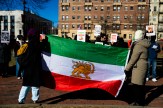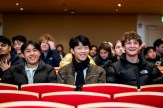Getting the scoop on international reporting
Northeastern journalism students enrolled in the Dialogue of Civilizations program, “Politics, Religion, Culture and Media in the Arab World” expected to learn how to cultivate sources, interview controversial subjects and post their articles on personal blogs.
But the program went well beyond expectations last spring, when three Northeastern students scored an exclusive interview and broke an international news story picked up by the New York Times and other major news outlets.
The exclusive with Egyptian political dissident Ayman Nour, jailed in 2005 for allegedly tampering with the democratic election process, captured the attention of Michael Slackman, the Cairo bureau chief for the New York Times, and boston.com’s “Worldly Boston” blog.
Speaking last May from his apartment in Zamalek, a district just outside the capital, Nour used the interview to announce that he would voluntarily complete a four-year prison sentence to protest his treatment after the Egyptian government released him four months early.
Senior journalism major Dani Capalbo interviewed Nour, and said her experience could serve as a launching pad for a future career in the profession.
“If I can do it as a senior at Northeastern within the constructs of this program,” she said, “if I were let loose in Cairo, maybe I could uncover other things.”
More than two-dozen journalism and international affairs majors made the trip to Egypt, Syria and Qatar. The journalism students faced a variety of hurdles in the Middle East, not the least of which was finding expert sources.
Northeastern political science professor Denis Sullivan, a Middle East expert on sabbatical in the capital city, helped students gain access to think tanks and professors at Syrian universities. If students were still shorthanded, they scoured English-speaking newspapers for experts.
“Sometimes in life we’re picked up and thrown into things,” said Northeastern journalism graduate student Clarice Connors, who wrote a story on a bombing that took place at an Egyptian market place. “But we have to work with what we are given. We made great contacts with insiders and we walked away feeling encouraged.”
And, she added, “I love that ‘last minute’ adrenaline; I love the chaos. It’s exhilarating in a way.”
An American journalist would be hard pressed to find a more difficult beat than covering the Middle East, added journalism lecturer Carlene Hempel, who accompanied the students on the trip.
“Students arrived without sources, without language skills and without bearings,” she explained. “They had to think and learn quickly and turn around and write on deadline in a way that others can understand.
“This is magnified 100 times by being in such an unfamiliar country,” she added. “It would be one thing if the students were in Europe—some might know Spanish or French—but no one knew Arabic and no one had functioned in that environment before.”
While the Nour interview was exciting, another experience turned out to be just as challenging in a very different way. Midway through the program, a trio of Northeastern journalists interviewed students from the American University of Cairo for a story about their decision to join a radical group. Soon, the students, fearing the wrath of the government, begged the young reporters not to use their names.
Should the foreign correspondents in-training uphold the wishes of the Egyptian university’s students, even though the interviews were on the record?
“Those of us trained as traditional journalists were upholding the same standards we have in the United States,” Hempel explained. “In America, if someone gives us his name and says we can quote him, it’s his responsibility” to deal with the repercussions.
On the other hand, “the international affairs students argued our point of view was presumptuous and even arrogant,” Hempel said. “They said that we don’t understand what life can be like for these people, that we can’t possibly understand the stakes.”
In the end, the student journalists decided they weren’t comfortable making a potentially life-altering decision by publishing their peers’ names on a blog. Nevertheless, the exercise proved an eye-opening lesson on journalism ethics in the Arab world.





